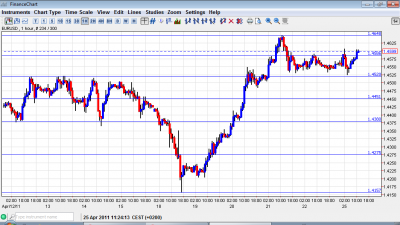EUR/USD is gradually moving up within range, as fears from Greece have been put on the back burner and tension towards the FOMC meeting mount and Mid-East violence weighs on the dollar. Will the pair break to higher levels, or respect the range during this thin volume trading day? Here’s a quick update on technicals, fundamentals and what’s going on in the markets.
EUR/USD Technicals
- Asian session: Calm session sees a dip towards 1.4520 and a rise from there. The climb to 1.46 happens in the European session.
- Current range – 1.4580 – 1.4650
- Further levels in both directions: Below 1.4580, 1.4520, 1.4450, 1.4375, 1.4282, 1.4160, 1.4030, 1.3950, 1.3860, 1.3760. 1.37, 1.3440.
- Above: 1.4650, 1.47, 1.48, 1.50, 1.5144
- Serious resistance is only at 1.47, after previous lines have been left behind, but its noticeable that the pair stopped at 1.4650 – this could be a point of struggle later on.
- 1.4580 is only minor support, with 1.4520 being much stronger, switching sides from resistance to support.
Euro/Dollar trading quietly higher – click on the graph to enlarge.
EUR/USD Fundamentals
- 14:00 US New Home Sales. Exp. 280K.
For more events later in the week, see the EUR/USD forecast
EUR/USD Sentiment
- US Fiscal worries: It’s not Greece. It’s the US. The government is about to reach the $14.3 trillion debt ceiling on May 16th (according to recent calculations). The Republicans in Congress refuse to raise the debt ceiling if their demands aren’t met. The consequences could be a default of the US on its debt payment. The chances are very slim, but this talk is gaining traction and weakens the dollar. Needless to say, a default of the US will not only end the recovery but also send the whole world into turmoil.
- Tension in the Middle East: In Syria, a strategic country in the region, the army has been fully mobilized to depress the uprisings in Deraa, Jabla and other cities. No one knows how this bloodshed will end. In Libya, NATO forces failed to assassinate Libyan ruler Gaddafi in an ongoing crisis there. Libya produces high quality oil and the civil war there has pushed oil prices higher. Higher oil means a weaker dollar.
- Tension towards Bernanke: The stakes are high for the FOMC Meeting on Wednesday, which will provide an answer for the continuation of QE2 and the first ever press conference following a US rate decision. See the FOMC preview for full details.
- Thin Easter trading: Markets are closed in Australia, New Zealand and all of Europe, meaning thin trading volume. Note that Asian and American markets operate as usual.
- No default for Greece over the weekend: There were strong rumors in the market regarding a “restructuring” for Greece during the long Easter weekend. Such a precedent could have a horrible snowball effect all over the continent, stronger than the bailouts. Greece not only denies it, but also chases the CitiGroup banker that allegedly started the rumor, although it’s obvious that the market reacted before his email. Two year yields have passed the 20% mark. This story has been sidelined in the meantime.
- S&P credit warning for the US: It’s quite rare seeing a credit warning for the world’s no. 1 superpower. This shocking event hurt USD/JPY at first, but now it reaches all currencies, with the Swiss franc and the Australian dollar breaking records. Also the Euro and the pound enjoy this weakness.
- Bailout for Portugal – Portuguese yields passed the 9.50% mark at the time of writing. The lack of support from the upcoming Finnish government and without an operating government in Lisbon, there’s less hope that this bailout will indeed happen. Perhaps Portugal will also default. Ireland could follow suit.
- Gold and silver continue higher: Gold is already above $1500 and silver above $45. This adds to the dollar’s weakness.

